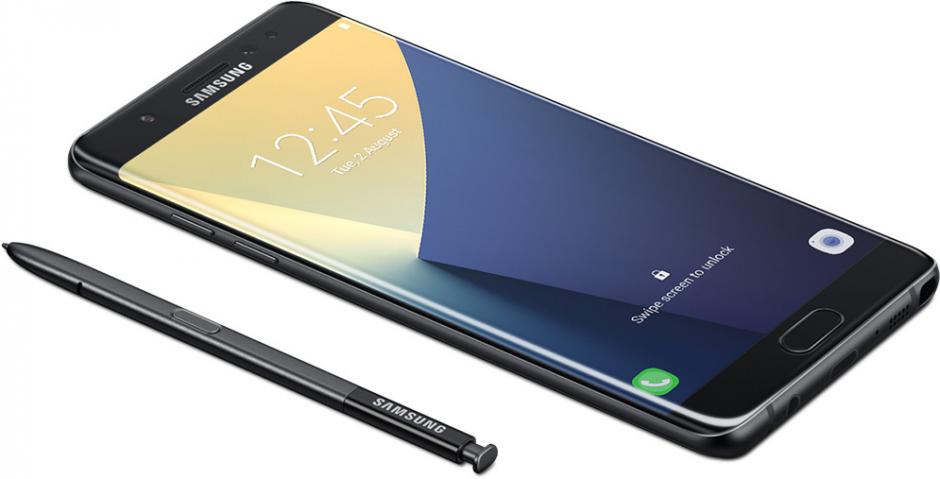Samsung halts production of ‘most intelligent smartphone’ Galaxy Note 7
When Samsung Electronics introduced its sleek, high-end Galaxy Note 7 smartphone in August, one of its senior executives called it “the most intelligent smartphone that we have ever created.” Today, that model — which the South Korean electronics giant was counting on to help it close the gap with Apple, its biggest rival — looks more like an expensive problem that will not go away.
Samsung has temporarily halted production of the Galaxy Note 7, a person familiar with the decision said today, amid reports that a number of the devices had caught fire. The decision comes just five weeks after Samsung said it would recall 2.5 million Galaxy Note 7 phones after reports of battery fires, suggesting that it has not been able to fix the problem.
Samsung had initially said that the problem was solved, after allowing consumers to trade in their phones for new ones. But production was halted after telecommunications companies in the United States and Australia said they would not offer the Galaxy Note 7 following reports of fires involving new phones in which the problem was supposedly fixed.
In a disclosure to the South Korean stock exchange later Monday, Samsung said it was “temporarily adjusting the Galaxy Note 7 production schedule in order to take further steps to ensure quality and safety matters.” It said it hoped to provide an update within a month.
Samsung made the decision to halt production for consumer safety reasons and in cooperation with the authorities in the United States and China, according to the person familiar with the process.
The problems call into question Samsung’s campaign to catch up with Apple. While Samsung is the world’s largest smartphone company by market share, Apple has a strong hold on the expensive end of the market with the iPhone. Samsung is also grappling with problems on another front. Last week, a large American hedge fund, Elliott Management, called for the company to overhaul its structure, putting pressure on Samsung’s leaders to justify their actions.
Samsung had been regaining some ground in the high-end market recently with its latest Galaxy phones, which feature curved edges and offer a more premium feel than its budget phones. The Galaxy Note 7 — with its 5.7-inch screen and a price tag exceeding $800 for a phone not tied to a specific carrier — was supposed to add to that momentum.

When the company announced the recall last month, it identified “a battery cell issue” and said it had stopped using batteries from that supplier, which it did not identify by name. But the recurring problem led industry experts to wonder whether the problem went beyond sloppy production and resulted from a faulty battery or software design.
The Galaxy Note 7 boasted a higher-capacity battery to help its increasingly sophisticated features, like an iris scanner for added security. It also supported fast and wireless charging technologies.
Samsung is by far South Korea’s largest and most profitable company, and its smartphones have been one of its main sources of revenue in recent years. The crisis threatens to undermine the brand name the company has taken decades to build.
Last week, Pak Yu-ak, an analyst at Kiwoom Securities Company in Seoul, the capital, estimated that the initial recall was the big driver behind a nearly 40 percent drop in operating profit for Samsung’s IT and mobile device division in the third quarter compared with the second quarter, though he predicted a fourth-quarter rebound.
Recall support wanes
But that was before major telecom companies began saying they would stop offering the Galaxy Note 7. Lee Se-cheol, an analyst at NH Investment & Securities in Seoul, said that if the sales of the Samsung model were to be suspended for the fourth quarter, it would cost $630 million in lost revenue, making the company more dependent on its semiconductor business for profit.
Samsung initially won plaudits for the scale of its Sept. 2 recall, the largest ever in the smartphone industry. But the recall has been plagued with problems, including communications issues between Samsung executives and safety officials in the United States.
Last week, a Southwest Airlines flight in the United States was evacuatedafter a Galaxy Note 7 began smoking inside the plane. The owner and his family told the news media that the phone was a replacement model. Samsung said it would investigate the incident. On Sunday, the American wireless carrier AT&T said it would stop selling or replacing Galaxy Note 7 smartphones because of reports of fires. Another major carrier, T-Mobile, also said it was temporarily halting sales and exchanges of new Galaxy Note 7s.
SK Telecom and other South Korean mobile carriers have not taken similar steps yet, saying that they were closely monitoring the situation. Three of Australia’s biggest telecom companies — Telstra, Optus and Vodafone Australia — said they had stopped shipping Galaxy Note 7 phones to customers after reports that the replacement model had caught fire in the United States.
“We have asked Samsung to provide us with an update on their investigations as a matter of priority and will update our customers as soon as we learn more,” said Steve Carey, a spokesman at Telstra, Australia’s largest carrier. There have been no reported fires in the handsets sold in Australia, Mr Carey said. (The New York Times)
[crp]






![Parliament in a past session. [Photo/Parliament of Kenya/Facebook]](https://businesstoday.co.ke/wp-content/uploads/2026/02/Parliament-Kenya-200x143.webp)











































![Pula Co-Founders and Co-CEOs, Rose Goslinga & Thomas Njeru. Pula provides agricultural insurance and digital products to help smallholder farmers manage climate risks, improve farming practices and increase their incomes. [ Photo / Courtesy ]](https://businesstoday.co.ke/wp-content/uploads/2021/01/Pula-Co-Founders-and-Co-CEOs-Thomas-Njeru-Rose-Goslinga.jpg)


























































![Parliament in a past session. [Photo/Parliament of Kenya/Facebook]](https://businesstoday.co.ke/wp-content/uploads/2026/02/Parliament-Kenya-680x486.webp)
Leave a comment